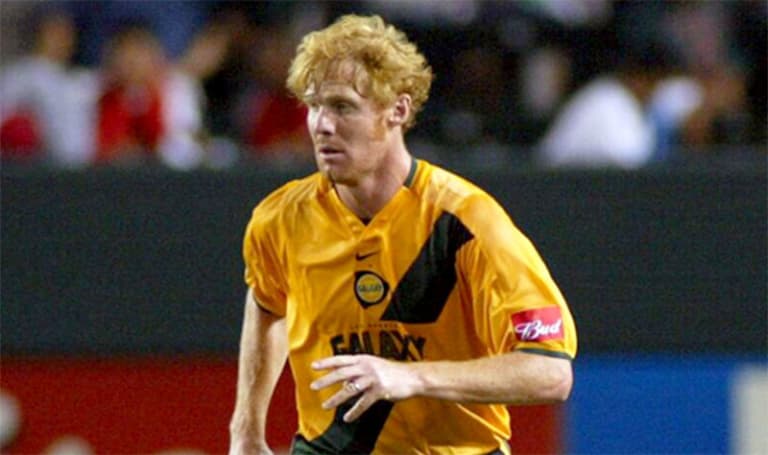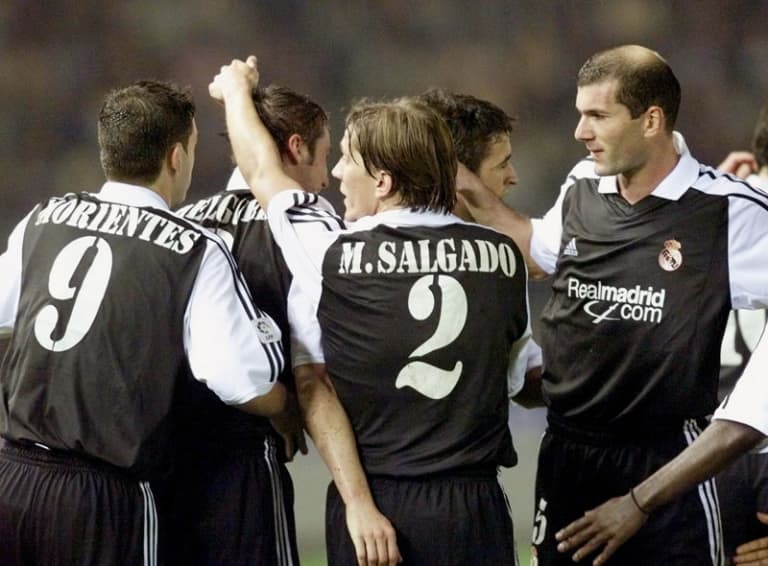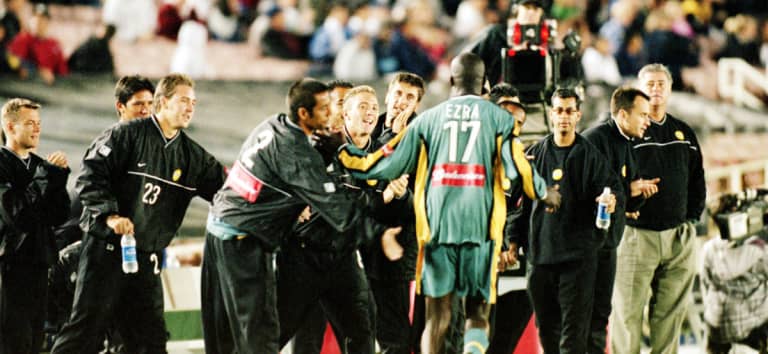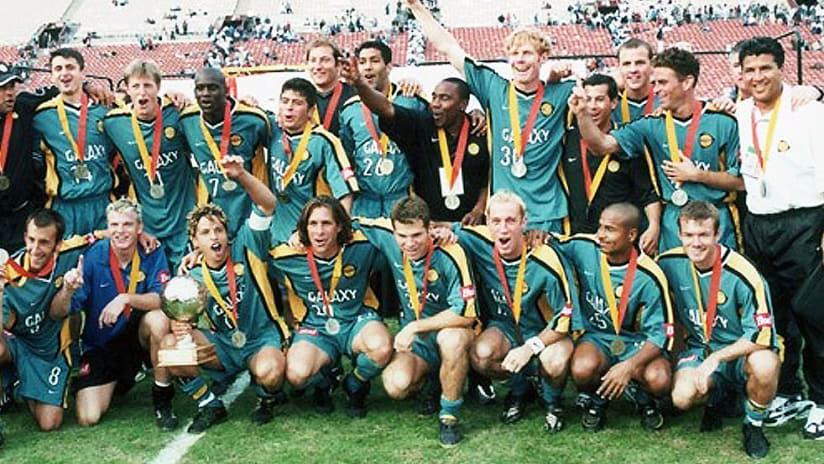CARSON, Calif. – The big prize in the CONCACAF Champions League, beyond the coveted trophy, is the trip to FIFA's Club World Cup, where lucrative tests against the other confederation titlists – the likes of Barcelona, Real Madrid and Bayern Munich, Corinthians and River Plate – offer a place on the global stage.
No Major League Soccer club has managed to break Mexico’s CCL hegemony in the year-end competition – the Galaxy, Seattle Sounders, D.C. United and Real Salt Lake are aiming to make history this year, heading into four MLS vs. Liga MX quarterfinal first legs next week – but it nearly happened once, back when the league was just a toddler and navigating a soccer world that looked very different.
Fifteen years ago, a makeshift LA Galaxy side were set to take on some of the world's best after winning the 2000 CONCACAF Champions' Cup, the precursor to the current regional championship, after banding together to win three games in less than a week to book a spot in the FIFA Club World Championship, as the event was then known.
Two months later, they were drawn to play Real Madrid, Ghana's Hearts of Oak and Japan's Jubilo Iwata in Group C of the CWC, set for Spain in late July and early August. The event would never take place. Whispers that economic troubles at ISL, FIFA's marketing partner, might kill the event grew louder until soccer's governing body finally pulled the plug two months before the tournament was set to begin.
“It was really a bummer not to get that opportunity, to compare your team to the rest of the world, especially the likes of a Real Madrid,” remembers Toronto FC head coach Greg Vanney, then a Galaxy defender. “We fancied our chances, that we might be able to get out of that group. But who knows? [Playing Real Madrid] would have been amazing.”
The path to that point wasn't simple, and the mix of elation and disappointment would serve the Galaxy well, a “turning point,” as CCC hero Ezra Hendrickson puts it, prodding them to the 2001 US Open Cup title and a third MLS Cup final appearance before capturing their first MLS Cup championship in 2002.
From Crisis to Champions

Alexi Lalas was returning from year-long soccer hiatus in January 2001 when he joined the Galaxy ahead of their CONCACAF Champions' Cup campaign. He didn't expect to play, but an injury to Danny Califf forced the 1994 World Cup star straight into the lineup. Photo via Getty Images
The 2000 Champions' Cup, played in Southern California, was scheduled for January 2001, so the Galaxy needed to get permission to begin preseason training in late December. Not everyone was available – Luis Hernandez was a no-show – and injuries deprived head coach Sigi Schmid of several important players, including center backs Robin Fraser and Danny Califf.
“It was a strange situation,” says Schmid, now Seattle Sounders FC head coach. “Getting the guys fit was difficult because they were coming off a break. We had two, nearly three weeks to prepare, that was it, and we had a ton of injuries. It made for a very difficult situation.”
Backup was found in Alexi Lalas, the US World Cup star, who had stepped away from the field in 2000 to “bum around the country, chase a girl that became my wife, and do some television.” He had moved to Los Angeles just before LA began preparations and asked Schmid if he could join the group to “run around and kick the ball.”
“A few days into training, he came over and said, 'If you're thinking about coming back, we should talk,'” Lalas remembers. “One thing led to another and I said yeah.”
Still, he was in no position to play. Then Califf was hurt while surfing on the eve of the event.
“I had no illusions that I was going to be playing after having a year off, certainly not with the quality that they had [at the back],” Lalas says. “That's when I got the call, 'Hey, we're starting this tournament tomorrow, and our friend Danny Califf has had a little accident. And we're going to need you to start.' It was complete luck that I even played in that tournament.”
The Galaxy had no available forwards, so Adam Frye – a utility player who had starred for Schmid at UCLA – was paired up front with Cobi Jones, normally a winger.
Nothing came easy. They played Honduras' Real España to a 0-0 draw in a quarterfinal at Cal State Fullerton's Titan Stadium, advancing via penalties, then traded PKs in a 1-1 draw with D.C. United in the semis at the Coliseum in Los Angeles. Kevin Hartman came up big in the shootout, with stops on Marco Etcheverry and Ben Olsen, and LA were headed to the final.
Beating D.C. meant plenty to the group. United had rallied to topple the Galaxy in MLS's first championship game, a little more than four years earlier, and then beat them again in the 1999 final.
“It definitely meant more because of the history between [the Galaxy] and D.C.,” Schmid recalls. “For us to be able to beat D.C., even though it was penalties, you could see the team – the guys that had been with the team for awhile, Cobi and all of them – for them it was a highlight moment.”
The Galaxy, which had let an early two-goal lead disappear in their 1997 CCC title-game loss to Cruz Azul, had to fight back from a first-half deficit and score a late winner to beat Honduras' CD Olimpia, 3-2, on Jan. 19 at the Coliseum. A Lalas handball gifted the Hondurans a 34th-minute penalty kick, but the big center back assisted twice in the next five minutes, with right back Ezra Hendrickson equalizing in the 36th and Jones providing an advantage in the 39th.
Olimpia pulled even a few minutes into the second half, but Hendrickson netted the decisive goal in the 78th minute from a sweet give-and-go with Mauricio Cienfuegos.
The Galaxy had prevailed despite using just 13 players in three games over five days. Eight players – Hartman, Lalas, Vanney, Jones, Hendrickson, Paul Caligiuri, Peter Vagenas and Simon Elliott – played every minute.
Rubbing Shoulders With Giants

The Galaxy were drawn into a group with Real Madrid ahead the 2001 Club World Cup, later postponed then canceled following a FIFA scandal. Los Merengues star-studded squad featured the likes of Zinedine Zidane, Raul, Luis Figo and Roberto Carlos.Photo via Reuters
The Intercontinental Cup, a meeting of European and South American champions dating to 1960, was officially an exhibition, so FIFA hadn't had a true world club championship until January 2000, when eight teams gathered in Brazil. São Paulo's Corinthians beat Rio de Janeiro's Vasco da Gama on penalties in the final.
The Galaxy were, of course, delighted to be one of a dozen teams taking part in the second edition, with a field that included Boca Juniors, Deportivo de La Coruña and Palmeiras. Olimpia also qualified, as CONCACAF runner-up.
LA was drawn into Real Madrid's group and would play twice at the club's historic Santiago Bernabeu.
“We were all excited about that, the chance to play at a cathedral in the game of soccer,” Hartman says. “To be drawn against Real Madrid, I don't know if it necessarily put the fear of God into us, but it was a little bit humbling to know we were going to have to compete against a team of that caliber.
“Whether or not we would have been competitive against the likes of Real Madrid, I certainly feel that we could have held our own against some of the other clubs that were involved.”
And there was more. The players would be able to showcase themselves on a world stage, increase their value and perhaps find a lucrative move to a club overseas. They would show the world that club soccer existed, for real, in America, that MLS deserved respect. And, best of all, FIFA had promised a load of cash for the competitors.
“There was a lot of money,” Jones says. “Some players were figuring out how many different things they could buy with the money. There was a significant bonus to be had just for going to the tournament, and if you won games and all that stuff, especially at that time in MLS, that was extremely important to a lot of guys. That would be more money than some of the guys made all year.”
But after the draw, on March 6, the rumblings about ISL began. The marketing firm, which held a huge imprint on global sport, had spread itself too thin, built debts of in the neighborhood of $300 million and was unable to avoid bankruptcy. FIFA terminated the marketing agreement, then announced the tournament would be pushed back to 2003.
“We heard snippets, but it was a different time, in terms of the instant-information age that we live in now,” Lalas remembers. “We knew that there were talks, but it's not something we had control over.”
In fact, Jones and his Galaxy teammates hadn't given “any credence” to the rumblings.
“We thought of course it's going to happen,” he says. “Why wouldn't it?”
A Dream Dies, But Opportunity Beckons

The LA Galaxy bench greets Ezra Hendrickson after the defender was substituted. After winning the 2001 CONCACAF Champions' Cup, the Galaxy would go on to capture the Western Conference title and the club's first US Open Cup. Photo via LA Galaxy
The announcement stung.
“It was definitely a bummer, but there had been enough 'this might not happen' going on – it wasn't all at once, so you'd have this big letdown,” Vanney remembers. “You kind of knew it was lingering in the balance there, and there was a good chance it might not happen for us. Everybody was disappointed."
The letdown was tempered somewhat by bonus money. FIFA paid $750,000 to each of the qualifying teams – more to the Spanish clubs, which lost marketing opportunities and game-day revenues – and some of that went to the players.
“Once the money came in,” Schmid says, “that helped ease the pain, so to speak.”
How much did they get? That remains a little fuzzy.
“I think we got about $40,000 [each], before taxes,” says Hendrickson, now head coach of the Sounders' USL-based reserve team. “It was very good. A large sum. Upwards of $20,000.”
Jones doesn't remember it that way.
“That sounds really high,” he says. “I thought it was zero. I don't think we got anything. I don't remember getting a bonus check at all.”
The team didn’t dwell on the missed opportunity or the windfall. They were marching toward a Western Conference title, would win their first US Open Cup crown, and make it to the MLS Cup final, where they found more disappointment in an overtime defeat to the San Jose Earthquakes.
“We were on our way to possibly winning our version of the triple,” Vanney says. “I have to say, losing to San Jose was more disappointing than the World Club Championship falling apart on us.”
The Galaxy would win the first of five MLS Cup titles the next year while again reaching the Open Cup final, then capture another MLS Cup three years after that. The CCC triumph laid the foundation for future success.
“I think that moment, standing up there and celebrating, holding silverware and winning things, I think it really set a precedent for that group,” says Lalas, who would go on to serve as the Galaxy's general manager from April 2006 through August 2008. “And a lot of that group stayed together going forward. And, yes, Carlos Ruiz came into the situation [in 2002], and some very important pieces, but the core of that group stayed together and did some pretty good things and won a lot.
“That was basically the start of it, actually winning things as opposed to just being there.”













